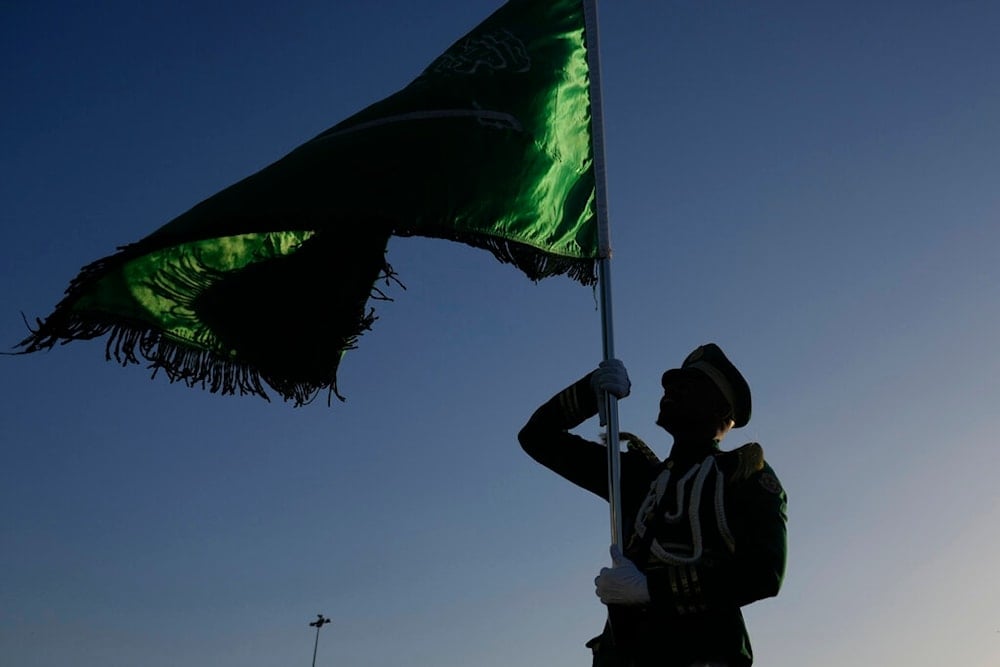Saudi Arabia to reassess spending amid oil slump: Financial Times
Saudi Arabia is reassessing its development projects amid falling oil revenues and global trade uncertainty, but plans to maintain spending to support non-oil growth and avoid economic instability.
-

A member of the Saudi special forces holds up the Saudi national flag during a military parade in preparation for the annual Hajj pilgrimage, in the Muslim holy city of Mecca, Saudi Arabia, Sunday, July 3, 2022. (AP Photo/Amr Nabil)
The Financial Times reported on Thursday that Saudi Arabia is reevaluating its development agenda in response to a significant drop in oil revenues and global economic disruptions, including those triggered by US President Donald Trump's tariffs.
Finance Minister Mohammed al-Jadaan told the outlet that the kingdom intends to maintain its current level of government spending despite widening budget and current account deficits and rising debt.
"We're not going to waste the crisis. People think that what's happening in the world is a crisis, but our economy is doing very well," Jadaan said. "It's a chance to look at things, if there's an opportunity to do something bold, do it."
He further noted, "A crisis provides us an opportunity to take stock and consider. Are we rushing [projects]? Are there unintended consequences? Should we delay? Should we reschedule? Should we accelerate?"
Jadaan stressed the importance of avoiding the "trap of booms and busts" that have historically affected oil-dependent economies. "We are very aware of how important it is that we don't go procyclical, but countercyclical," he said. "Instead of working to just balance the books, by design we are making sure that we spend in support of the growth."
Budget recalibration
Despite Brent crude trading at about $64 a barrel, down from an average of $82 last year, Saudi Arabia plans to continue its ambitious development projects under Crown Prince Mohammed bin Salman's $1 trillion Vision 2030 initiative.
The Public Investment Fund (PIF), responsible for these megaprojects, is undergoing a "very prudent exercise of making sure that they also recalibrate," according to Jadaan, who sits on the PIF's board. This includes a comprehensive review of the Neom project, a $500 billion futuristic development.
Read more: In quest of funds, Saudi developers plan private NEOM tour for bankers
The government's budgeted expenditure for this year shows a slight decrease compared to last year, with priority sectors including tourism, manufacturing, logistics, renewable energy, and technology.
However, the Kingdom faces challenges, having recorded an 18% drop in oil revenue in the first quarter of 2025 compared to the same period in 2024, leading to a fiscal deficit of $15.6 billion, the highest quarterly deficit since 2021.
Deficit flexibility
The International Monetary Fund (IMF) forecasts that the budget deficit will widen above 4% of GDP this year and next, with a break-even oil price of $92 a barrel. Nonetheless, Jadaan expressed that he would not be concerned if the deficit widened to 3%, 4%, or "occasionally" 5% of GDP, as long as government spending supports non-oil growth, a key metric of the kingdom's diversification plans.
To manage the fiscal gap, Saudi Arabia, already one of the biggest emerging market issuers of debt this year, will have to borrow more. However, with a debt-to-GDP ratio of 26%, Jadaan stated he did not foresee "any reasonable scenario" that would make the Kingdom even come close to the ministry's ceiling of 40%.
"There will possibly be more deficit than we anticipated in the budget, but not significant," Jadaan said. "We still have plenty of room in our fiscal buffers, ample foreign reserves [and] significant government reserves."
Read more: Saudi Arabia puts development plans on hold amid economic revamp
Despite the economic challenges, the Kingdom still expects GDP growth to meet the forecast of 4.6% for the year, driven by non-oil activities, up from 1.3% in 2024. The IMF, however, forecasts 3% growth, a slight downward revision from an earlier estimate. Jadaan concluded, "That gives us a lot of confidence. But we aren't complacent."

 4 Min Read
4 Min Read










